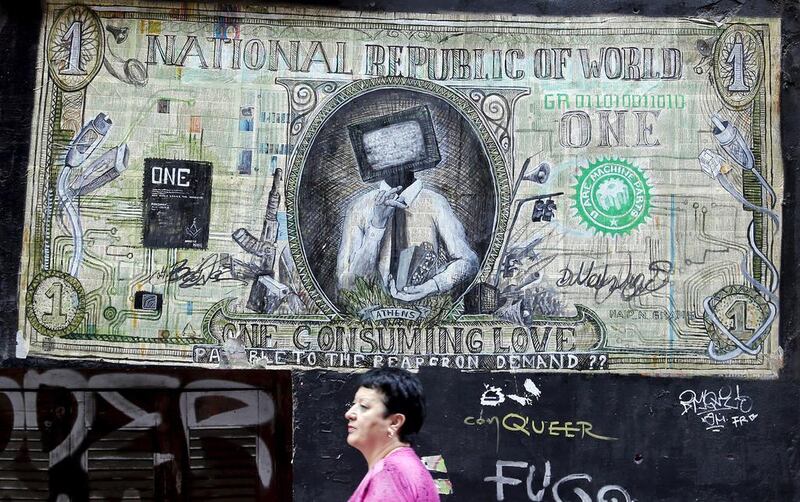The Greek finance minister warned yesterday that Europe would lose a €1 trillion (Dh4.08tn) if it allowed his country to go under.
Greeks vote today on whether to accept or reject tough conditions sought by international creditors to extend a lending lifeline keeping the country afloat. The vote could decide if the country remains within the single currency.
Officials across Europe say a No vote would deepen Greece’s economic misery. The Greek prime minister Alexis Tsipras says a No vote is the only way out of it. For pollsters, the result is too close to call.
“What is certain is that Greece won’t be facing just massive economic problems. It will be a deeply divided country,” said Nikos Marantzidis, a pollster and professor of political science at the University of Macedonia in northern Greece. “Greece is on the brink of a new national schism.”
The vote is being held against a backdrop of mounting national pessimism after a week in which banks closed and ATM withdrawals were rationed.
The Spanish newspaper El Mundo quoted the Greek finance minister Yanis Varoufakis as saying European action towards the country was "terrorism" and that €1tn would be lost if Greece was allowed to crash.
“Why have they forced us to close the banks? To frighten people. And when it’s about spreading terror, that is known as terrorism,” Mr Varoufakis said in the interview, which was published yesterday.
“If Greece crashes, the equivalent of Spain’s GDP will be lost. It’s too much money and I don’t believe Europe could allow it,” he said.
Regardless of the result, today’s vote has focused attention on the likely fallout for Europe.
The European Central Bank has said it can calm any regional market turmoil that follows Greece’s referendum.
With two asset-buying programmes, international swap lines, backstops for eastern Europe and cash tenders in place, the ECB has a wide range of tools at its disposal should bond yields surge or money markets freeze after the vote. That is a possible outcome if voters reject the terms of a European Union-led bailout.
Yet even if the Greek people back the EU offer, the country’s lenders, which have been shut and under capital controls for the past week, will not be able to reopen soon unless the ECB approves more liquidity. To do that, monetary policy officials would have to take a leap of faith that the government will be able to strike a new deal.
In the meantime, Greece is running out of currency.
Without a fresh injection from the ECB – or a reduced ceiling on withdrawals – ATMs will start running out within hours of the vote, according to Louka Katseli, the chairwoman of the National Bank of Greece.
“Liquidity is adequate through the end of the bank holiday” that is due to end tomorrow night, she said.
The precarious condition of the finance industry explains the urgency of today’s vote. Rejecting the terms, as the government wants, would endanger the ECB loans that have kept banks afloat.
The ECB now has more financial instruments available to contain ripples that threaten the stability of other banks, as well as legal backing from the European Court of Justice to use them as it sees fit, and has said it was ready to do so.
With no room left for interest-rate cuts, the central bank’s most obvious option is more bond purchases. That could be done through its current quantitative easing or the untested Outright Monetary Transactions programme.
The executive board member Benoit Coeure said last week that the ECB could develop “new instruments” to rein in market volatility, without saying what they might be.
Mark Carney, the governor of the Bank of England, said last week that finance ministries and central banks were in touch with each other over contingency plans.
“Those contingencies could be put in place if necessary,” Mr Carney was quoted as saying by Sky News. “Quite frankly, they haven’t been necessary because we haven’t seen this spillover of the risks in Greece into broader financial markets or into broader Europe.”
The German finance minister Wolfgang Schaeuble was quoted as saying by the tabloid Bild that the risks of contagion remained small.
“Even if it came to a collapse of some individual banks, the risk of contagion is relatively small,” he said. “The markets have reacted with restraint in the last few days. That shows that the problem is manageable.”
Voting is scheduled to close at 7pm in Athens Sunday night.
* with agencies
business@thenational.ae
Follow The National's Business section on Twitter





